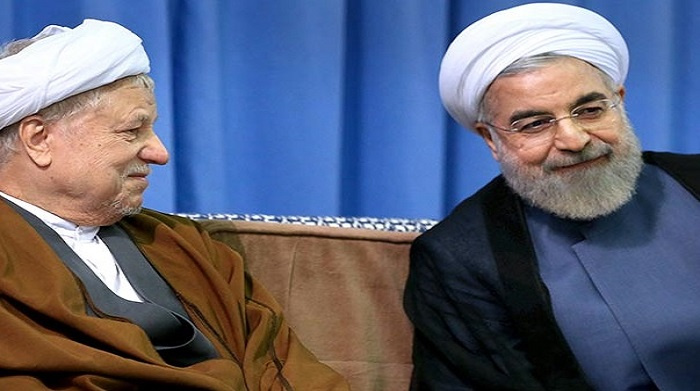Rouhani, Surrogate Losing Ground or Messenger of New Approach?

A recent story by Fars News Agency is decorated with a photo of a bent-down Hassan Rouhani, collecting his cloak while walking against a lightly blurred background of what seems to be a seminar in which former presidents Rafsanjani and Khatami see him off as he is apparently going to a podium. The report is all about what has been the “surrogate” that Rouhani and his presidency allegedly are, to use the words of reformist politician Ebrahim Asgharzadeh, uttered early after Rouhani took office, as Fars does.
The rumors in the air are that Rouhani is distancing himself from his two main supporters, kingmakers Rafsanjani and Khatami, and is thus being under increasing pressure to withdraw from next year’s presidential race. The principlists have constantly warned Rouhani that the coalition between Rafsanjani and the reformists sees him as a surrogate to incubate their own embryo-- a vague description that might explain what the principlists fear to signify more fundamental reforms.
On Saturday, Arman daily, linked with Hashemi Rafsanjani, published a report on a roundtable it held between reformist political commentator Sadegh Zibakalam and Abdolreza Davari, one of ex-president Ahmadinejad’s insiders. Davari says both reformism and principlism are dead. Instead, he puts forward binary labels based on revolutionary values. “Former reformists advocate change inside but have no belief in change in the international sphere and seek integration with the global system,” he said in his definition of the non-revolutionary faction which includes Hashemi Rafsanjani and Mohammad Khatami. On the other side, he says, stands the revolutionary stream which is “inclined toward conservatism inside ... seeking change in international relations”. In response to Zibakalam’s dichotomy of authoritarianism and democracy, Davari said the real conflict in Iran lies between the center and the suburbs, as Ahmadinejad believes.
Asked about how an election with Rouhani and Ahmadinejad competing would go, Zibakalam said: “Ahmadinejad will openly rub it in Rouhani’s face that people’s lives have not improved. The truth is, despite the wide rift existing between the principlists and Ahmadinejad, they will have no choice but to put everything aside and back him. Of course, if they care about Iran’s future, they will not follow Ahmadinejad. Clearly, by the moment of speaking, the principlists have lost the 2017 election.” Elsewhere in his remarks he noted that if Rouhani fails to take effective measures in economy, leaving eight million people jobless, stagnation unresolved and corruptions surviving, Ahmadinejad and the principlists will have a better chance. Zibakalam, who considers the reformists’ victory unconditional in the absence of Ahmadinejad, says the real questions are whether Rouhani wants to run and whether the reformists back him again. “Perhaps Rouhani should declare that he has had a mission, namely the nuclear deal, that he has accomplished and thus managed to handle the duty the people put on his shoulders; that he has no interest to run for president but introduces someone and starts working in the assembly of experts,” Zibakalam said. “If he does so, he would become a kingmaker. Rouhani would better endorse Aref or Zarif in 2017. If the plan takes place, the reformists will have higher chances,” he added. He ended his remarks on a high note about Ahmadinejad. “Ahmadinejad, if he runs, will ruin everything like a tank. He comes and says my rival has supporters who have looted the nation’s resources; Rouhani has no place and it is Hashemi who is behind him and the reformists; the election is Hashemi’s battle against me … and he will try to play Robin Hood”.
Back in the Fars article published today, the so-called report argues that the pressure on Rouhani to step down at the end of his tenure comes from the reformist camp. The core of the argument is based on Hashemi Rafsanjani’s remarks made in February in which he advised those well-known disqualified parliamentary candidates to endorse new faces, just as he backed Rouhani who, he said, was polled to have 3 percent of the ballots but won 50 percent within a week. Self-contradictory as it may seem, the article quotes Rouhani, in response to an unnamed prominent cleric who allegedly wanted to encourage him to withdraw in favor of other candidates, as saying “I no longer want to be the second man”.
Iran’s reformist-principlist flip-flop might take different names but will continue to be decisive in every election. Is Rouhani’s moderation formula a temporary relief or the building block of a completely new approach?

